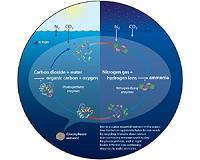| . |  |
. |
Bangkok (AFP) Jan 21, 2011 Thailand has closed a host of popular dive sites to tourists indefinitely to allow coral reefs to recover from widespread bleaching caused by warmer sea temperatures, authorities said Friday. In total 18 areas in seven marine parks are off-limits, according to an order by the Thai National Park, Wildlife and Plant Conservation Department. "Diving in all the spots is to be halted indefinitely until the reef has fully recovered," said department official Songtham Suksawang. The ban, effective in seven of 26 marine parks, mainly covers sites in the Andaman Sea on the west coast. It also applies to snorkelling. Songtham said the authorities would limit the number of people visiting certain other reefs at the same time. Coral on Thailand's east and west coasts is thought to have been damaged by last year's unusually high sea temperatures caused by El Nino, as well as excessive human activity near the reefs, a statement by the department said. The ban was imposed in certain areas that "have widespread bleaching of more than 80 percent to allow the reef to rehabilitate", it added. Sea temperatures were said to be around two degrees Celsius (3.6 degrees Fahrenheit) higher than normal in the affected regions. A study by Australia's Centre of Excellence for Coral Reef Studies in October said reefs in Southeast Asia and the Indian Ocean were dying from the worst bleaching in over a decade after sea temperatures across the region rose in May 2010. Bleaching is caused by the warm water sweeping over the reefs, shocking the corals and causing them to shed the algae that nourish them. If corals fail to regain their algae, they starve to death. Scientists say corals are vital to marine life because they provide habitats for a vast variety of creatures and absorb large levels of poisonous carbon dioxide. Reefs are also a big draw for tourists looking to explore the wealth of underwater life. Thailand is a popular destination for divers, with many resort islands offering excursions to the reefs strung along the country's more than 3,000 kilometres (1,900 miles) of coastline. The ban affects certain areas in the popular national parks of Similan and Phi Phi, as well as sites in Tarutao, Chao Mai, Chumphon, Phetra and most of Surin. Penalties for non-compliance will run to fines and jail sentences and authorities have also vowed to step up patrols to stop illegal fishing. Anchoring sites at spots not affected by the closures would also be increased to reduce damage done by boats to reefs. Authorities said the coral bleaching will be closely monitored while the ban is in place.
Share This Article With Planet Earth
Related Links Water News - Science, Technology and Politics
 Ocean Bacteria Recycles Iron
Ocean Bacteria Recycles IronMoffett Field CA (SPX) Jan 18, 2011 In the vast ocean where an essential nutrient - iron - is scarce, a marine bacterium that launches the ocean food web survives by using a remarkable biochemical trick: It recycles iron. By day, it uses iron in enzymes for photosynthesis to make carbohydrates; then by night, it appears to reuse the same iron in different enzymes to produce organic nitrogen for proteins. The bacterium, ... read more |
|
| The content herein, unless otherwise known to be public domain, are Copyright 1995-2010 - SpaceDaily. AFP and UPI Wire Stories are copyright Agence France-Presse and United Press International. ESA Portal Reports are copyright European Space Agency. All NASA sourced material is public domain. Additional copyrights may apply in whole or part to other bona fide parties. Advertising does not imply endorsement,agreement or approval of any opinions, statements or information provided by SpaceDaily on any Web page published or hosted by SpaceDaily. Privacy Statement |